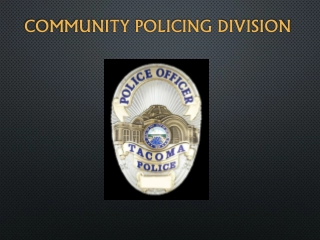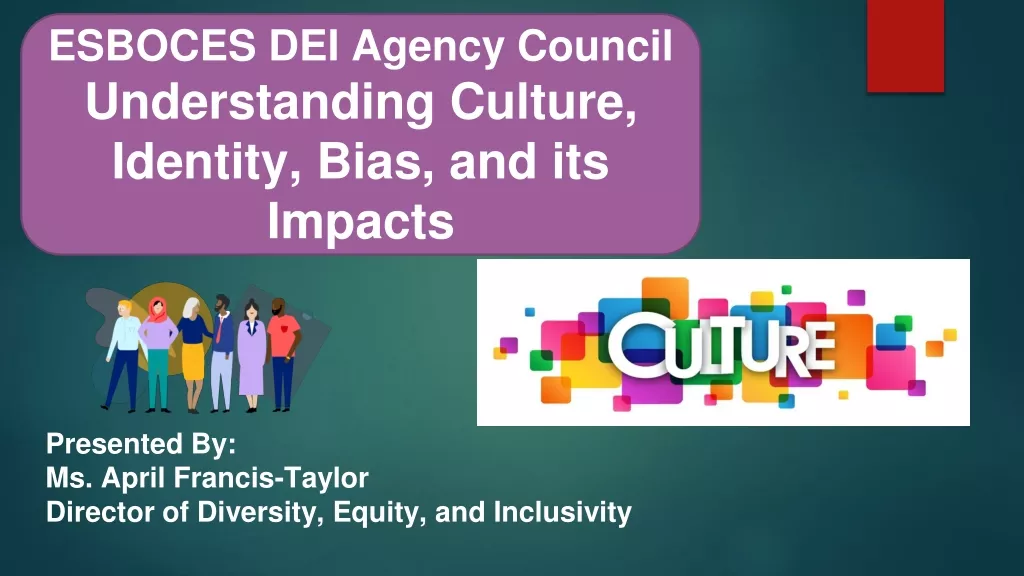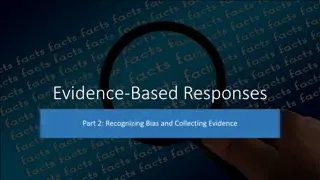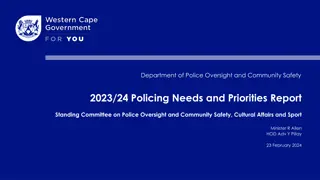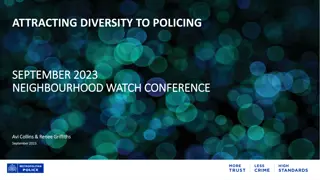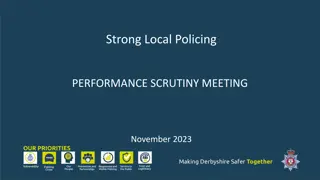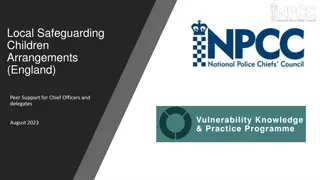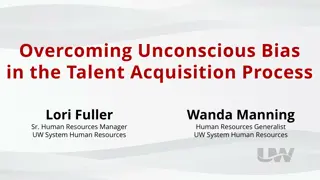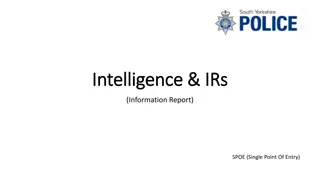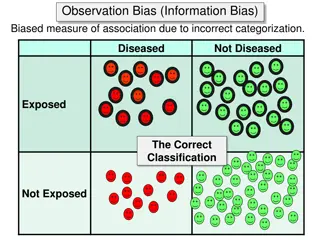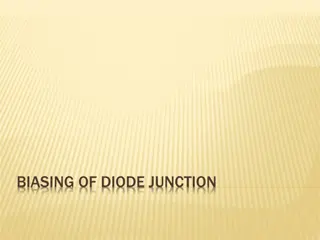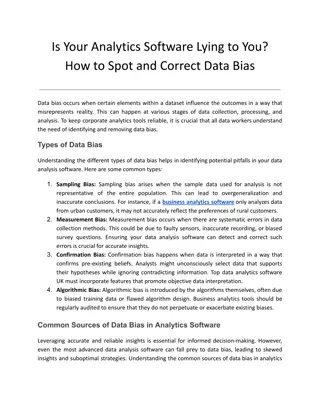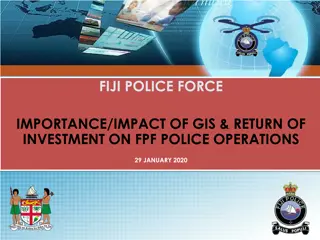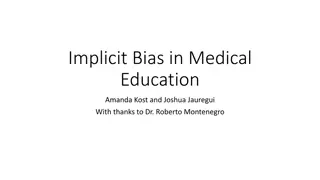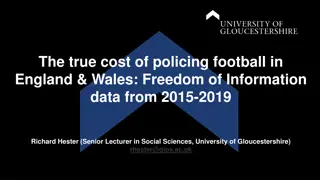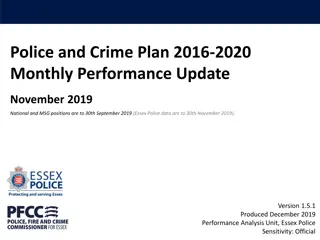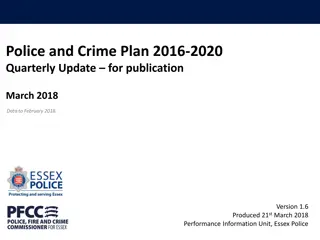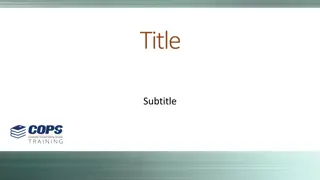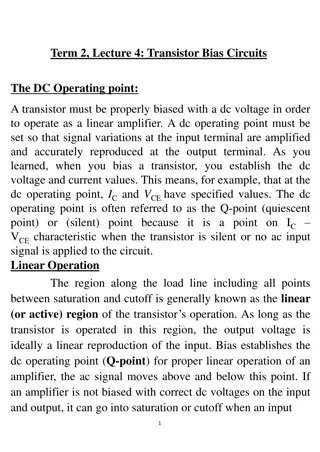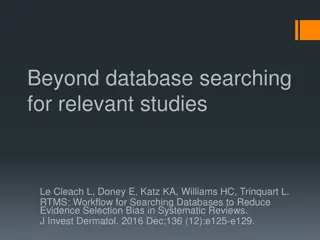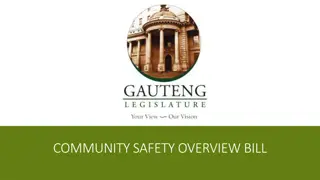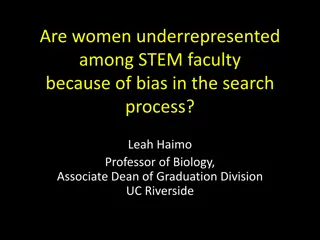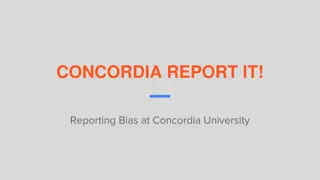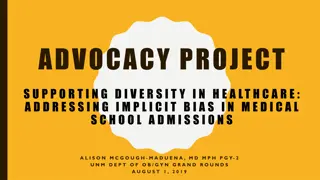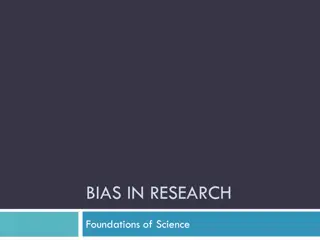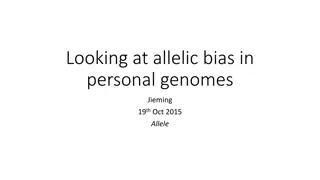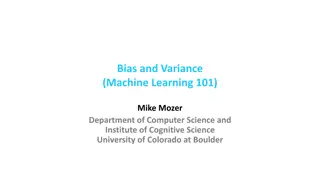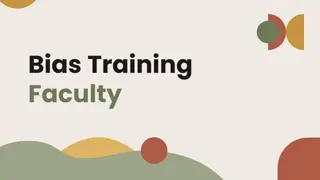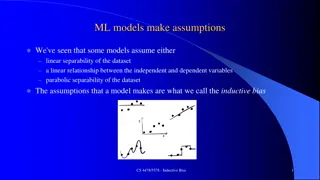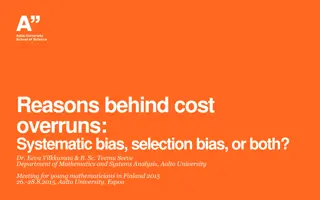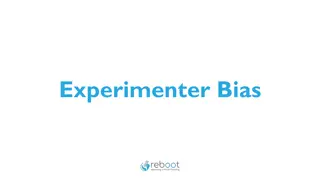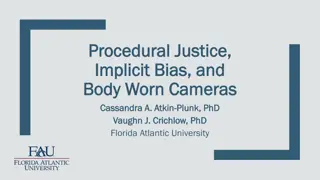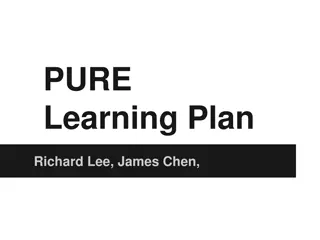Community Policing Division
The North End Tacoma Community Policing Division operates with the aim of coordinating proactive policing efforts with citizens to ensure safety and security in the community. Led by Captain Christopher Travis, the division comprises two lieutenants, an administrative lieutenant, 16 Community Liaiso
2 views • 40 slides
Modern Policing Degree Program
Join key stakeholders in a discussion on the AB89 Task Force's findings and recommendations for developing a modern policing degree program in collaboration with the California Community Colleges Chancellor's Office. Explore how local colleges can address these recommendations proactively.
1 views • 29 slides
Understanding Culture, Identity, Bias, and Diversity in the Workplace
This presentation highlights the importance of understanding culture, identity, bias, and their impacts in the workplace. Through courageous conversations and diversity training, participants learn to unpack implicit bias, combat bias, and develop teamwork skills. The session emphasizes staying enga
0 views • 19 slides
Understanding and Avoiding Bias in Evidence-Based Responses
Recognizing bias in oneself and others is crucial when collecting evidence. Different types of bias, such as confirmation bias, can influence decisions and behaviors significantly. By exploring our own thinking and accessing curated resources to learn about bias, we can develop a deeper understandin
1 views • 14 slides
Policing Needs and Priorities Report 2023/24
The Department of Police Oversight and Community Safety's report outlines key findings and recommendations for improving law enforcement effectiveness, addressing serious crimes, firearm violence, gang-related activities, public order policing, youth development, and safety infrastructure. The repor
3 views • 25 slides
ATTRACTING DIVERSITY TO POLICING.
Exploring current strategies and statistics on attracting diversity to policing, this presentation highlights the progress made in increasing representation of women, BAMEH individuals, and Black officers in the police force. Despite improvements, there are still targets to meet in order to align wi
3 views • 13 slides
Tipperary Joint Policing Committee Statistical Overview February 2024
Providing a statistical overview of the Tipperary Joint Policing Committee's current position in February 2024, including data on domestic abuse incidents, property crime broken down by district, crime against the person, proactive policing measures, and traffic offenses. The data compares the perio
3 views • 17 slides
Strong Local Policing Performance Review Highlights November 2023
Achievements in the past 12 months include initiatives like the RCRP Mini Police Programme, Operation Shango, and the Violence Reduction Unit. The focus has been on strengthening neighborhood policing teams, recruiting more officers, increasing volunteers, providing training and support, and enhanci
4 views • 12 slides
Recognizing Hidden Bias in the Workplace
In the workplace, hidden bias, also known as implicit bias, can significantly impact hiring, employment decisions, and overall workplace dynamics. Deloitte's 2019 State of Inclusion Survey revealed that a substantial percentage of workers experienced bias at least monthly. Hidden biases can be based
3 views • 18 slides
Ohio Collaborative Standard Bias-Free Policing
Explore the Ohio Collaborative program for bias-free policing, focusing on maintaining public trust, transparency, and adherence to laws. Learn about the state's commitment to eliminating biased-based profiling and promoting responsible policing practices.
0 views • 33 slides
Facilitation Support for Senior Police Leaders in Protecting Vulnerable Individuals
Facilitation support is offered to senior police leaders to enhance their collective response in protecting individuals facing abuse, neglect, and exploitation. The Policing Facilitator role provides peer support, tactical advice, resources, and professional development guidance to amplify the voice
1 views • 9 slides
Overcoming Unconscious Bias in Talent Acquisition Process
Overcoming Unconscious Bias in Talent Acquisition Process emphasizes the importance of addressing unconscious bias in hiring practices through awareness and control. The content delves into defining unconscious bias, its impact on diversity, examples, and strategies for managing bias. The University
0 views • 19 slides
Understanding and Utilizing Bias in Legal Proceedings
Exploring the complexities of bias in legal settings, this content provides insights on identifying, addressing, and leveraging bias in litigation. From defining various forms of bias to strategies for cross-examination and case presentation, it equips legal professionals with practical knowledge to
0 views • 19 slides
Understanding Intelligence Reporting and Assessment in Policing
Intelligence plays a crucial role in police decision-making by providing evaluated information. This report outlines the National Intelligence Model, criteria for assessing intelligence relevance, accuracy, and value, as well as guidelines for information submission in law enforcement settings. It e
0 views • 8 slides
Types of Bias in Epidemiological Studies
Bias in epidemiological studies can arise from misclassification of observations and exposures, leading to incorrect associations between variables. Observation bias, misclassification bias, and non-differential misclassification can impact the accuracy of study results, either minimizing difference
1 views • 11 slides
Understanding Diode Junction Biasing: Zero and Forward Bias Conditions
In the world of electronics, diode junction biasing plays a crucial role. This article delves into the concepts of zero and forward bias conditions for diodes. When a diode is zero-biased, no external potential energy is applied, while in forward bias, a specific voltage is introduced to initiate cu
0 views • 21 slides
Is Your Analytics Software Lying to You_ How to Spot and Correct Data Bias
Data bias can distort your analytics and lead to misguided decisions. In this blog, learn how to identify common signs of data bias, understand its impacts, and explore effective strategies to correct it. Enhance the accuracy and reliability of your insights with practical tips and advanced tools, e
3 views • 8 slides
Enhancing Fiji Police Operations with GIS Implementation
The Fiji Police Force is integrating Geographic Information Systems (GIS) to enhance policing operations through improved situational awareness, crime trend analysis, resource deployment, and cost savings. By investing in GIS technology, the force aims to optimize efficiency, decision-making, and ov
1 views • 17 slides
Understanding Implicit Bias in Medical Education
Delve into the origins, forms, and manifestations of bias in clinical and medical education settings. Learn strategies to mitigate and address bias through a detailed exploration of terms like System 1 and System 2 thinking, implicit bias, race/racism, sexism, microaggressions, and more. Gain insigh
6 views • 27 slides
The True Cost of Policing Football in England & Wales: A Research Study
University of Gloucestershire's Senior Lecturer, Richard Hester, conducted a study on the actual expenses associated with policing football in England and Wales from 2015-2019. The research reveals discrepancies between official figures and actual costs incurred, highlighting the need for transparen
0 views • 6 slides
Essex Police and Crime Plan 2016-2020 Performance Update November 2019
The November 2019 update on Essex Police's performance under the Police and Crime Plan 2016-2020 reveals a 13.6% increase in all crime for the period to November 2019 compared to the previous year. While some improvements have been made in various priorities, concerns persist in areas such as local
1 views • 15 slides
Essex Police Quarterly Update March 2018: Priorities and Progress
The Essex Police and Crime Plan 2016-2020 Quarterly Update for March 2018 highlights various priorities including boosting community volunteering, tackling anti-social behavior, and enhancing visible policing. Efforts to increase the Special Constabulary, engage Active Citizens, and improve public a
0 views • 15 slides
Community-Oriented Policing Services Project Summary
This project, supported by cooperative agreement number 15JCOPS-2#-GG-XXXXX-XXXX from the Office of Community Oriented Policing Services, U.S. Department of Justice, discusses the author(s)' opinions on community policing. Disclaimer: The views expressed are those of the author(s) and not necessaril
0 views • 4 slides
Understanding Transistor Bias Circuits for Linear Amplification
Transistor bias circuits play a crucial role in setting the DC operating point for proper linear amplification. A well-biased transistor ensures the signal variations at the input are accurately reproduced at the output without distortion. Various biasing methods such as Voltage-Divider Bias, Emitte
0 views • 7 slides
Managing Reporting Bias in Systematic Reviews - Strategies and Consequences
Reporting bias poses a significant threat to the accuracy of systematic reviews, with publication bias affecting up to 50% of trials. This bias distorts treatment effect estimates, leading to exaggerated outcomes. Strategies to mitigate reporting bias include searching bibliographical databases, exp
1 views • 17 slides
Strengthening Community Safety Oversight Bill for Effective Policing
The Community Safety Oversight Bill aims to enhance safety through improved oversight of police conduct, systemic failures, and community complaints. It emphasizes partnerships, holistic policing needs assessment, and cooperative governance. The Bill establishes the Provincial Police Ombudsman and S
0 views • 12 slides
Understanding Transition Bias and Substitution Models in Genetics
Transition bias and substitution models, explored by Xuhua Xia, delve into the concepts of transitions and transversions in genetic mutations, the causes of transition bias, the ubiquitous nature of transition bias in invertebrate and vertebrate genes, the mitochondrial genetic code, and RNA seconda
1 views • 25 slides
Gender Bias in STEM Faculty Recruitment
Research indicates that women are underrepresented among STEM faculty members, potentially due to bias in the search process. Studies show evidence of bias against women candidates in male-dominated fields like mechanical engineering, leading to lower hiring rates. Another study revealed bias in fac
0 views • 29 slides
Addressing Bias-Related Incidents at Concordia University
The report discusses bias reporting at Concordia University, highlighting the importance of understanding and addressing bias-related incidents. It covers examples of bias, distinction between bias incidents and hate crimes, and strategies for response. Presenters from the Office of Multicultural En
0 views • 11 slides
Addressing Implicit Bias in Medical School Admissions
Increased diversity in the healthcare workforce benefits health outcomes, but implicit bias can impact candidate selection in medical school admissions. This advocacy project aims to address implicit bias by developing training sessions for new members of the admissions committee at UNM SOM, focusin
0 views • 9 slides
Uncovering Bias in Research: Foundation of Science
Exploring the presence of bias in research, this compilation delves into various types of biases such as confirmation bias and fundamental attribution error. It also addresses the challenges of explaining behaviors rooted in biases and offers insights on reducing bias in the scientific process. Thro
0 views • 6 slides
Investigating Allelic Bias in Personal Genomes
This study delves into allelic bias in personal genomes, examining the influence of various factors such as sequencing datasets, removal of reads with allelic bias, and the impact on allele-specific single nucleotide variants (AS SNVs). The revised AlleleDB pipeline proposed includes steps for const
0 views • 6 slides
Understanding Bias and Variance in Machine Learning
Exploring the concepts of bias and variance in machine learning through informative visuals and explanations. Discover how model space, restricting models, and the impact of bias and variance affect the performance of machine learning algorithms. Formalize bias and variance using mean squared error
0 views • 21 slides
Enhancing Bias Training for Faculty at the University of Utah
Transform faculty training on bias at the University of Utah through engaging slides designed to raise awareness, combat implicit bias, and promote inclusivity. Empower educators to recognize and address bias in their teaching practices for a more equitable learning environment.
0 views • 21 slides
Understanding Inductive Bias in Machine Learning
Machine learning models rely on inductive bias, which are the assumptions made by algorithms to generalize from training data to unseen instances. Occam's Razor is a common example of inductive bias, favoring simpler hypotheses over complex ones. This bias helps algorithms make predictions and handl
0 views • 20 slides
Understanding Implicit Bias: Exploring Bias, Stereotypes, and Discrimination
Explore the concept of implicit bias through discussions about prior knowledge, feelings pre and post taking implicit association tests, and how this awareness can be applied beneficially in personal and classroom settings. Definitions of implicit bias, stereotypes, prejudice, and discrimination are
0 views • 21 slides
Understanding Cost Overruns in Projects: Systematic Bias vs. Selection Bias
Cost overruns in projects can be attributed to systematic bias, like optimism bias and strategic misrepresentation, or selection bias where projects with low estimated costs are more likely to be selected leading to underestimation. Mitigating these biases is crucial for accurate project budgeting a
0 views • 21 slides
Understanding Experimenter Bias in Research Studies
Experimenter bias occurs when researchers introduce their own biases into an experiment, potentially impacting the outcome. This bias can manifest in various ways, such as manipulating results or selecting participants who confirm preconceived notions. Through examples in studies about toddler sleep
0 views • 9 slides
Understanding Procedural Justice, Implicit Bias, and Body Worn Cameras
This content covers the concepts of procedural justice, implicit bias, and body-worn cameras in the context of law enforcement. It explores the importance of procedural justice, strategies for enhancing it, and its significance in policing, with a focus on fairness and legitimacy. The images provide
0 views • 38 slides
Investigating Bias in Newspaper Articles through Natural Language Processing
The project, mentored by Jason Cho and advised by Professor Eric Meyer, focuses on automatic bias detection in newspaper articles. It involves recognizing similar article topics and detecting bias using tools like OpenNLP and Python NLTK. The endeavor aims to uncover words correlated with bias and a
0 views • 5 slides
